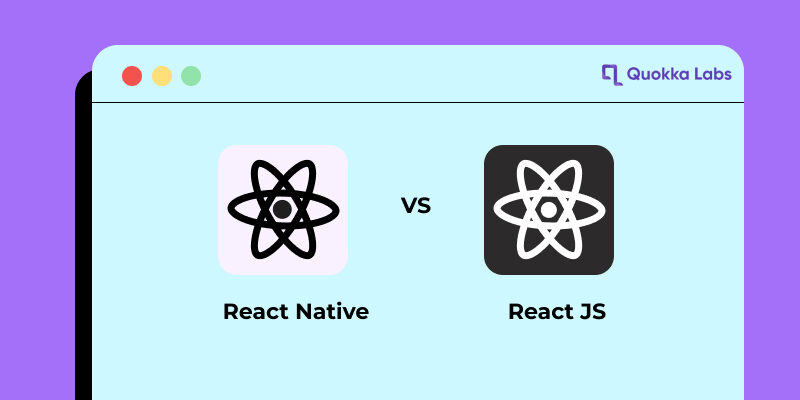
While exploring job hunting sites or web searches, React and React Native are more visible. However, people still get confused between the two. Thus, to resolve the dilemma of newbie developers, we have prepared a blog listing the essential key differences.
Confusion is usual. We want to clarify a few things.
React is just a package, while React Native is a framework. Reflect on the following key points of React Native vs React JS and decide which one to select for your next project.
Points to Make the Best Decision: React Native Vs React
Small business enterprises prefer React and React Native. They save cost and effort while elevating performance and user experience. Each can satisfy modern project requirements.
Check the following to select the best of the two!
Core Purpose:
If you are aiming to develop a dynamic, responsive, and interactive app for web platforms, React is the go-to option. It complements all web-based APIs and libraries to launch web experiences for state management and routing.
Conversely, if you want to develop a native app for mobile platforms, go with React Native. It also needs additional setup with emulators for Android and iOS testing and SDKs. From navigation to push notifications to GPS and other mobile-based default accessibility, React Native can complement specific libraries.
Decide what is best for your purpose: React Native vs React?
Performance:
It doesn’t require multiple releases as it has a virtual DOM perfectly optimized for the web app performance.
React Native enables reusable components and native APIs and optimizes performance for mobile apps.
Syntax:
React and React Native derive from the same place and hold the essence of JS; thus, their structuring is quite similar. Yet, being a framework, React Native also accesses specific components and syntax for structuring UI.
So, be clear as syntax clarifies the React Vs React Native.
Community and Ecosystems:
As mentioned earlier, React is preferred for web applications; thus, that segment is rich. There is a suite of libraries and tools to do experiments.
React Native has earned its spot as the mobile application development framework; thus, mobile app developers have raised its popularity. The number of libraries, tools, and other resources is increasing per industry preferences. Decide which can serve you the best React or React Native app development company.
Styling and Code:
React uses CSS styling and platform-agnostic code to manage the behavior and appearance of web applications and APIs on the browser side.
React Native accesses a JavaScript-based styling system to customize components for this; it depends on the stylesheet object. Furthermore, React Native enables consistent functioning across Android and iOS devices, maintaining behaviors and appearances.
Logic and Code Reusability:
React is well-optimized for browser-side apps; thus, it delivers a native app experience and doesn’t lag. It can also share some logic to create web versions.
React Native can create cross-platform apps for mobile and the web. However, there are chances of lag during heavy computation.
UI/ UX Rendering:
React has a virtual DOM that accesses HTML and CSS to manage UI rendering. On the other hand, React Native accesses native UI components to deliver a modern yet authentic mobile app experience. This difference also differentiates React vs React Native project development flow.
Cost and Budget:
We’re creating only a web version with React, so it takes less time and effort. Investment depends on complexity, resources, and developers’ efforts.
React Native is the best choice for developing cross-platform apps in minimum time, sharing a common codebase. Also, you don’t need to spend much on hiring separate resources.
Decision for Project Development: React Native vs React?
Where to Prefer React?
Be it simple, standalone single-page web applications or complex high-traffic applications, React is the perfect choice. It enables the application to be built with server-side rendering, aligns the SEO metrics with higher efficiency, loads load balancing, and dynamic UI rendering.
If you consider scaling and compressing the features at any point, you can manage them with the utmost consistency and smooth transitions.
It has modular, reusable component-based architecture, re-rendering capabilities, and state management. So, if your project needs an admin panel or dashboard, forums, or e-commerce websites, React is best. Furthermore, you can build portals, healthcare apps, browser-based games, blogging platforms or portfolio sites, digital whiteboard apps, or document editing tools.
Forms and surveys are worth it to increase customer interactions and engagement. Real-time chat apps are also worth it. React can be preferred there, as it infuses interactivity and intuitiveness. Streaming apps like Netflix can also be built using React capabilities.
Where to Prefer React Native?
Facebook, Instagram, Uber Eats, Wix, and Shopify are well-known names that adopt React Native capabilities. Thus, if your major audience is on smartphones, React Native is best.
It can provide a seamless experience with utmost security. Whether stock trading, crypto, blockchain, shopping or travel booking apps, general new blogging, productivity, social media, or gaming, React Native offers rapid development, minimizing time and effort.
Final Words:
React and React Native are trending worldwide; both suit diverse project requirements. Businesses can hire React JS developers or React Native Developers to develop interactive and dynamic apps. The choice is yours: whether you prefer a mobile or web app to streamline business operations.
If you need any suggestions for app development, ask us. We’re a well-known React and React Native app development company with great business and development ethics!











